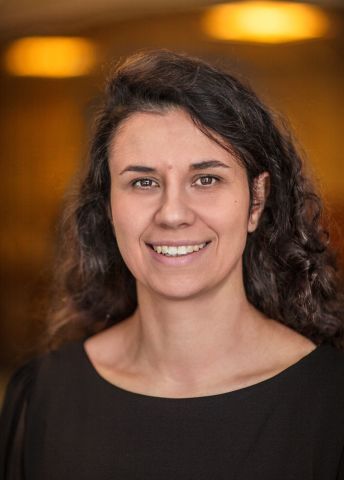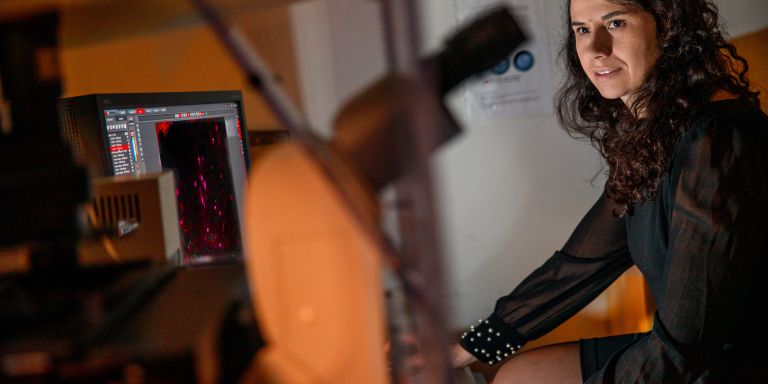
Sanja Vickovic
PhD in genetic engineering
Wallenberg Academy Fellow 2021
Institution:
Uppsala University
Research fields:
Colon cancer, precision medicine


Wallenberg Academy Fellow 2021
Institution:
Uppsala University
Research fields:
Colon cancer, precision medicine
Colon cancer is the fourth most common cancer diagnosis in Sweden. It has increased sharply in recent decades, and improved diagnostics only explain part of the increase. Inflammation in the intestine increases the risk of cancer, but otherwise much remains unknown. Genetics and lifestyle certainly play a role, as well as potentially which bacteria live in the gut and how our immune system interacts with the disease.
“There’s no shortage of hypotheses, but there are too few methods for exploring them,” says Vickovic.
Vickovic wants to change this. As a Wallenberg Academy Fellow at Uppsala University, she hopes to develop a technique to detect and analyze extremely large numbers of substances in individual cells. The aim is to track the development of cancers, make more accurate prognoses and observe the immune system’s responses in detail. Vickovic – who is not a doctor or biologist but an engineer with a doctorate in genetic engineering – calls her technique a “digital pathology platform.”
When a patient is believed to have cancer, tissue samples are taken and studied under a microscope. Pathologists are able to see if tissue contains cancer cells and assess the stage of the disease. Colon cancer is divided into four stages from 1, when there is a small number of cancer cells and the patient can almost always be cured, to stage 4, which is extremely challenging to treat.
“So, an experienced pathologist is able to see a certain amount, but unfortunately not what’s really happening in the tissue. We want to find biomarkers, molecules that indicate in a measurable way what disease you have and how it might develop.”
Vickovic’s method makes it possible to measure as many as 20,000 biomarkers at once in a single cancer cell and in neighboring cells, for example immune cells. However, not all the 20,000 substances are associated with the condition, so it is important to figure out which ones are. The researchers will use deep learning, a type of artificial intelligence in which computer programs are trained on large amounts of data to learn which factors are relevant. Vickovic hopes to be able to combine the biomarkers with existing imagery data in a kind of forecast algorithm.
“The goal is to understand the processes of the disease so well that we can suggest changes in today’s drugs, identify targets for new treatments, and explain why certain treatments only work for certain patients.”
One example of this is immunotherapy, a type of cancer treatment where the body’s own immune system is stimulated to fight cancer. This form of treatment works well for some forms of cancer, but in the case of colon cancer, only a small percentage of patients respond. Perhaps the new technique will explain why this is the case.
Vickovic currently commutes between the New York Genome Center, where she is head of the technology laboratory, and Uppsala University, where she is bringing her research.
“I really like that I can test my technique directly. Here in Uppsala, I can explain my ideas to healthcare colleagues and be told ‘Sure, we can probably use that. What patient samples do you need?’ As an engineer, if you don’t talk to clinicians early on about what you’re doing, then your discovery becomes completely meaningless. A lot of people are worried about not being taken seriously or someone stealing what they came up with, but for me pitching ideas has always been positive.”
“To take precision medicine forward, engineers and clinicians really need to sit down and talk to each other and think long-term. We do that here in Uppsala. That’s why I’m so happy to be able to take my research here.”
Uppsala University has biobanks with cancer cells from nearly a thousand patients with colon cancer, and complete mapping of cells’ genetic material. This information will be used to develop the technique so that it will be possible to make quick and simple readings of cells and patients’ blood samples. This will then make it possible to make diagnoses earlier, easier to monitor the disease, and change treatments, as necessary. Taking blood samples is straightforward and can be done frequently, while taking tissue samples involves discomfort and risks for patients.
Vickovic grew up in Zagreb, Croatia, in a family of three generations of academics. It was taken for granted that she would also study at university, and she had nothing against that. But when she moved to Sweden to do a master’s degree, it was not only the academic pursuit that attracted her. Vickovic was an elite ice hockey player and came to Stockholm to play for local team AIK.
Two things changed her plans: a knee injury and some highly inspiring tutors at KTH.
“I fell in love with science. My tutors showed me a world where you could combine mathematics and engineering with biology and genetics, which I’d known nothing about until then. It was the perfect combination. So, I went from playing hockey full time to doing research full time.”
With a scholarship from Knut and Alice Wallenberg Foundation, Vickovic moved to the US and MIT, where she specialized in computational biology and technology development in neurodegenerative diseases.
“Diseases of the brain are super-interesting. But over time, I became more interested in the link between the nervous system and the gut, and the interaction between neurology and the immune system and the gut bacteria – the whole area was so exciting that I realized I had to keep at it and then colon cancer came up.”
When Vickovic was younger, her mother said she could not imagine her daughter behind a desk telling her what to do. And this is what Vickovic thought a life as a researcher would be like, but now she knows that this is not the case. In Uppsala, she feels that the university and research funding give her considerable freedom.
“Research funding is often granted for specific projects, and results have to be delivered within a few years. Not that many financiers say ‘We believe in you. We understand that it may take 20 years to get to where you want to be, and we’ll try to make sure you get as many of those years as possible’. But that’s how it feels with the Wallenberg Foundations. It’s fantastic. Now I can explore the more random ideas that I think can take my field forward.”
Text Lisa Kirsebom
Translation Nick Chipperfield
Photo Magnus Bergström